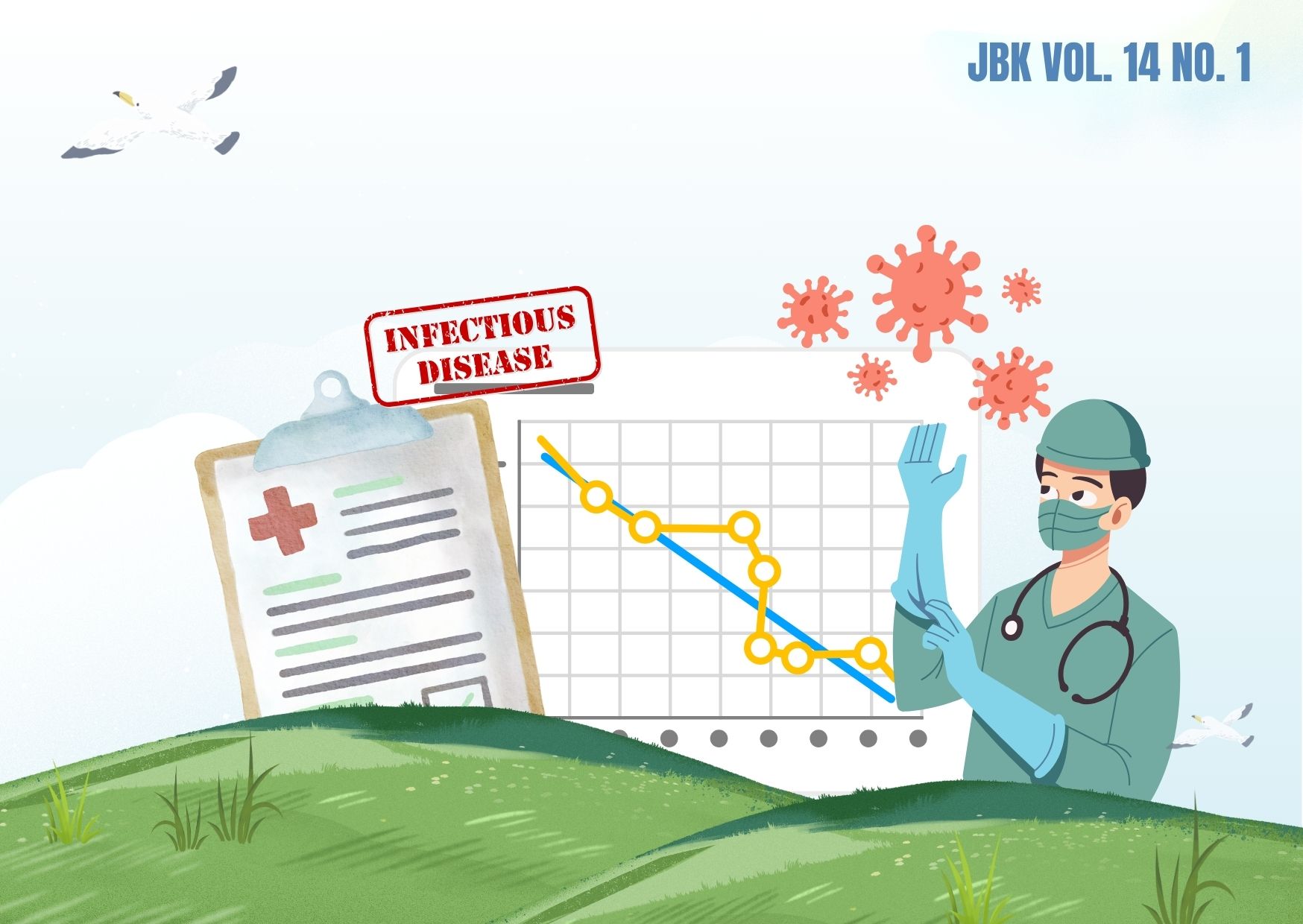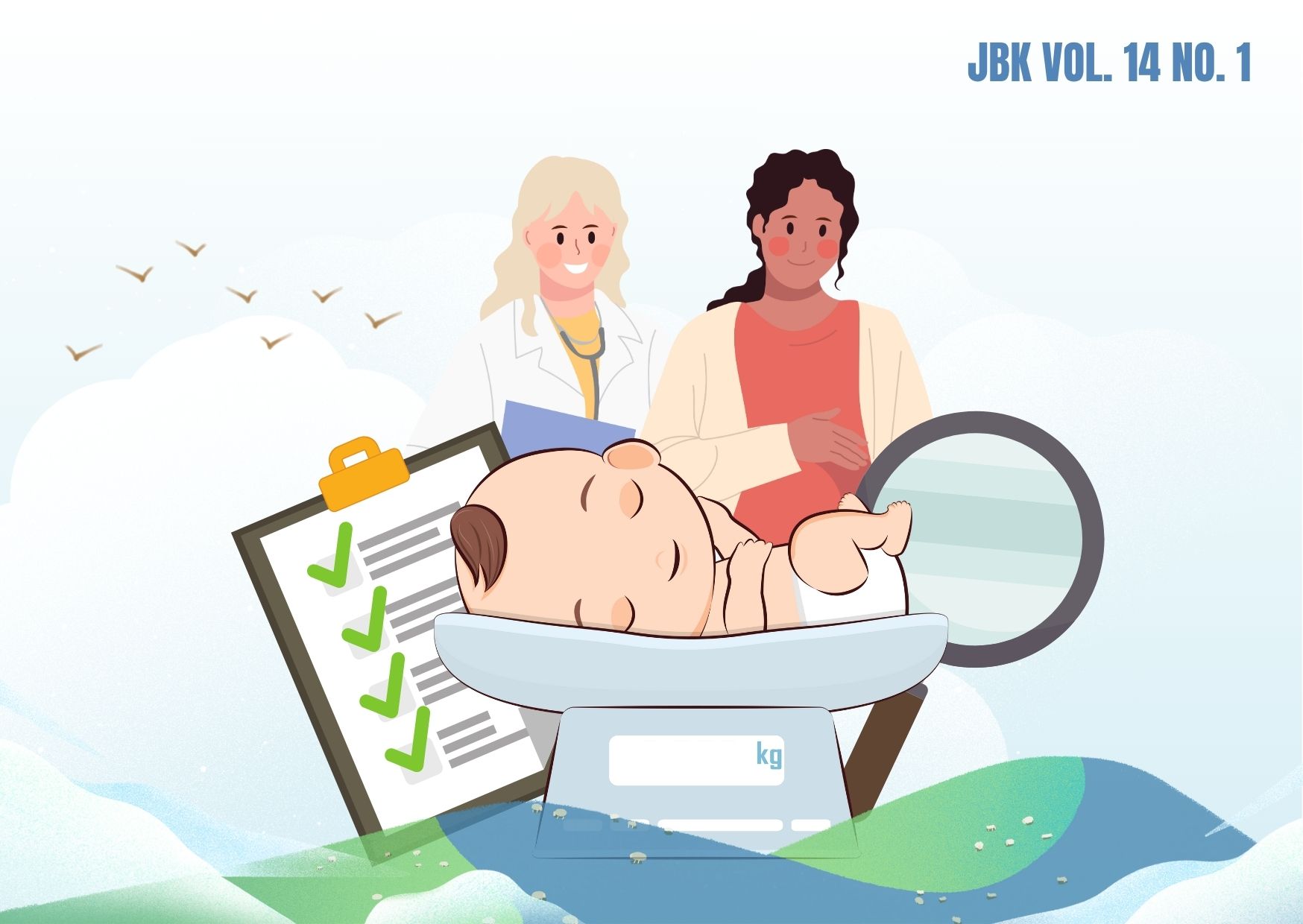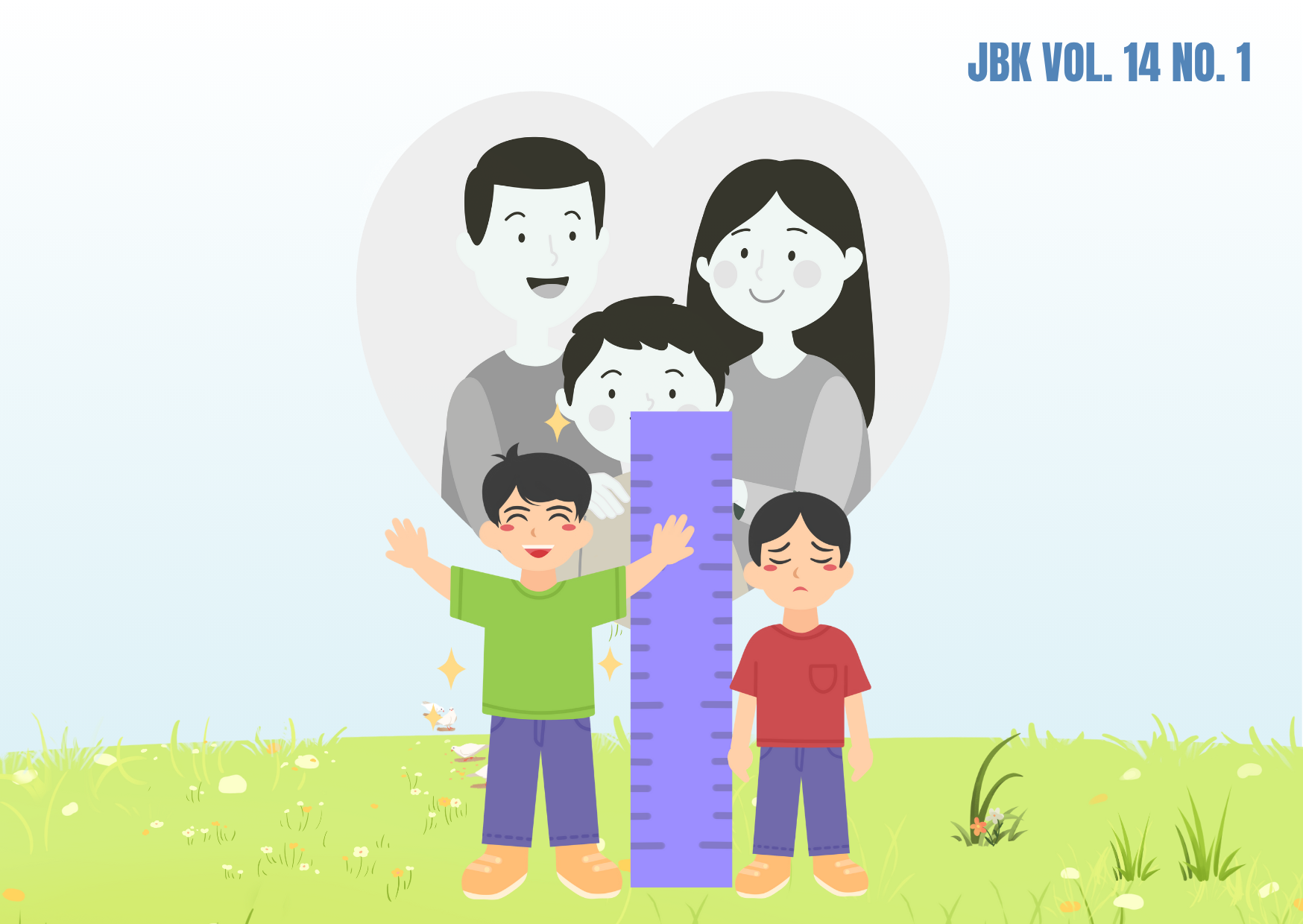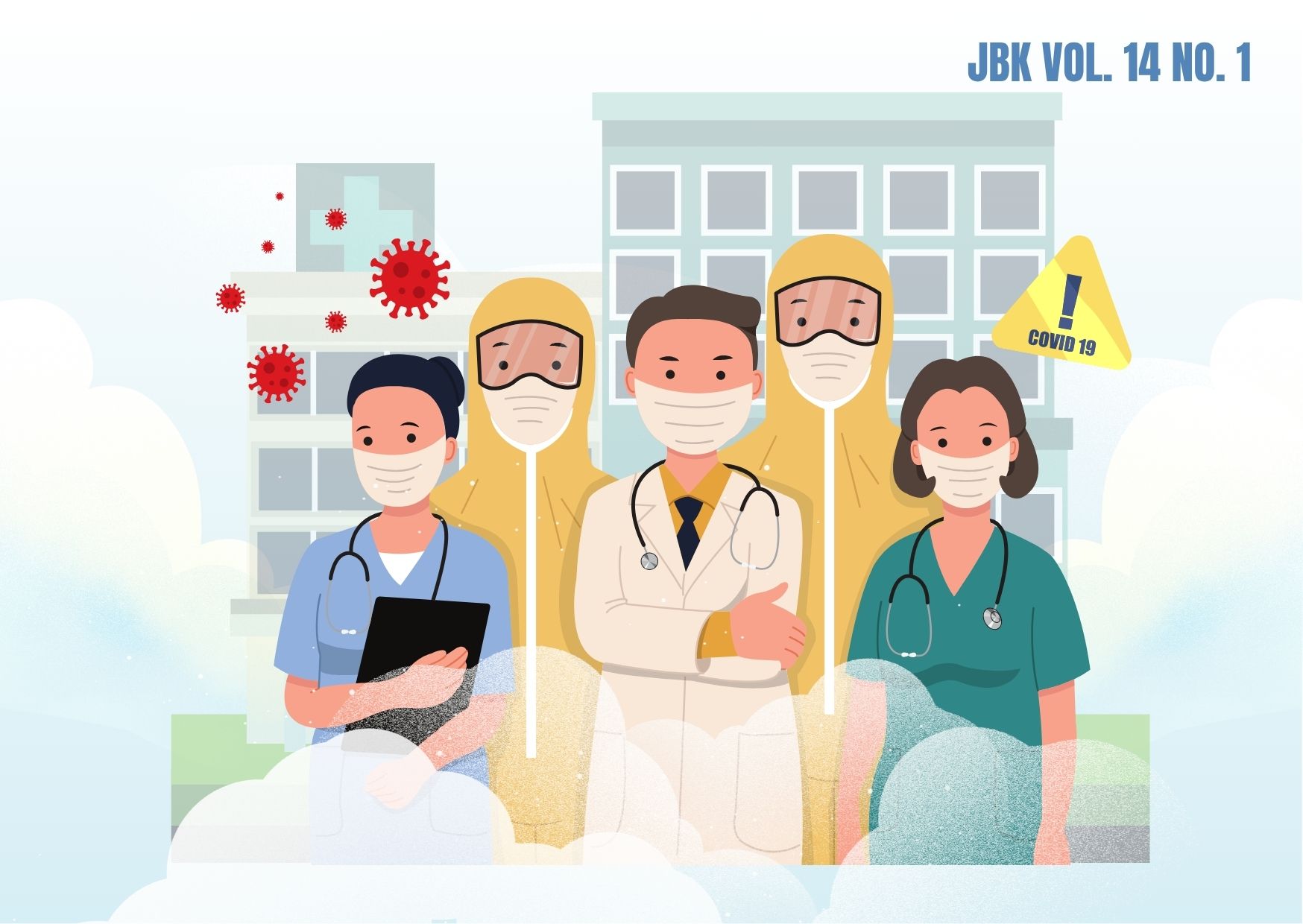PREDICTION OF THE SUM OF NEW FAMILY PLANNING ACCEPTORS IN THE IMPACT OF THE COVID-19 PANDEMIC: A STUDY USING THE ARIMA MODEL
The sum of new Family Planning (KB) acceptors in Pamekasan Regency decreased from March to April 2020 due to the COVID-19 pandemic. This decline will hinder the increase in achieving the Modern Contraceptive Prevalence Rate (mCPR) as the target of the 2020-2024 National Medium Term Development Plan (RPJMN), so modelling is needed to predict the sum of new family planning acceptors in Pamekasan Regency. This research aims to predict the sum of new family planning acceptors in Pamekasan Regency using the ARIMA model. This research is a non-reactive quantitative research. The unit of analysis for this research is all-new monthly family planning acceptors in Pamekasan Regency. The data used is the number of new monthly family planning acceptors from January 2016 to December 2021, sourced from the Pamekasan Regency Women's Empowerment, Child Protection and Family Planning Service. The research results show that the best model for predicting the number of new family planning acceptors in Pamekasan Regency is ARIMA [1,1,1] with the equation 0.0011(B)11Zt=0.006+0.0001(B)at. Prediction results using the ARIMA model [1,1,1] show that the number of new family planning acceptors tends to increase in January-December 2022. The sum of new family planning acceptors shows an increasing pattern, but the increase does not reflect the impact of the end of the COVID-19 pandemic.
World Population Data Sheet. Demographic Trends May Make Us Vulnerable to Pandemics Data Table [Internet]. 2020. p. 22. Available from: https://www.prb.org/wp-content/uploads/2020/07/letter-booklet-2020-world-population.pdf
Statistics Indonesia. Statistics Indonesia Statistical Yearbook of Indonesia 2020 [Internet]. Vol. 1101001, Statistics Indonesia. ISSN/ISBN : 0126-2912. 2020. 790 p. Available from: https://www.bps.go.id/publication/2020/04/29/e9011b3155d45d70823c141f/statistik-indonesia-2020.html
Trisnu CGSP, Sudiana IK. The Influence of Population Growth, Unemployment, and Education on Poverty Levels in Regencies/Cities in Bali Province. E-Jurnal EP Unud [Internet]. 2019;8(11):2622–55. Available from: https://ojs.unud.ac.id/index.php/eep/article/download/48204/32350Risk of Death with Disease
Satria RMA, Tutupoho RV, Chalidyanto D. Analysis of Covid-19 Comorbid Factors. J Nursing Silampari [Internet]. 2020;4(1):48–55. Available from: https://doi.org/10.31539/jks.v4i1.1587
Aulia G, Fahriati AR, Ratnaningtyas TO, Utami SM, Pratiwi RD, Ismaya NA, et al. Covid-19 Prevention Education with the Health Protocol of 5M and the Importance of Multivitamins During Covid-19 Pandemic. JAM J Abdi Masy [Internet]. 2021;2(1):133–9. Available from: http://openjournal.wdh.ac.id/index.php/JAM/article/view/138
Fathoni A. The Impact of Covic-19 and the Government's PSBB Policy on MSMEs in Wiyung Surabaya. Dinar J Sharia Economics Study Program [Internet]. 2020;3(1):30–69. Available from: https://e-jurnal.stail.ac.id/index.php/dinar/article/view/126/109
Oktavia W, Hayati N. Characteristic Patterns of Terminological Language Varieties during the Covid 19 Pandemic (Coronavirus Disease 2019). Tabasa J Indonesian Language, Literature and Its Teaching [Internet]. 2020;1(1):1–15. Available from:https://doi.org/10.22515/tabasa.v1i1.2607
Sirait LI. KB Acceptor Visits During the Covid-19 Pandemic. In: Proceedings of the National Seminar of STIKES Syedza Saintika [Internet]. 2021. p. 425–35. Available from: http://jurnal.syedzasaintika.ac.id/index.php/PSNSYS/article/view/949
Ministry of Health of the Republic of Indonesia. Guidelines for Family Planning and Reproductive Health Services in the COVID-19 Pandemic Situation [Internet]. Ministry of Health of the Republic of Indonesia. 2020. p. 5. Available from: https://infeksiemerging.kemkes.go.id/download/Panduan_Pelayanan_KB_dan_Kespro_Dalam_Situasi_Pandemi_COVID-19.pdf
Hayadi BH, Sudipa IGI, Windarto AP. Artificial Neural Network Forecasting Model on Active KB Participants in Government Pathway using Artificial Neural Network Back-Propagation. MATRIK J Management, Inform Tech and Comput Engineering [Internet]. 2021;21(1):11–20. Available from: https://doi.org/10.30812/matrik.v21i1.1273
Ermi N. The Use of Contraception in Couples of Childbearing Age during the Covid-19 Pandemic in Indonesia: Literature Review. AVICENNA [Internet]. 2021;16(2):53–63. Available from: https://media.neliti.com/media/publications/375236-the-use-of-contraception-in-couples-of-r-8239af60.pdf
Arianti C, Wibowo A. ARIMA Modeling of the Number of Achievements of New IUD KB Participants. J Biometrics and Population [Internet]. 2015;4(2):191–200. Available from: http://journal.unair.ac.id/download-fullpapers-jbk4e45e37406full.pdf
Wiyanti DT, Pulungan R. Time Series Forecasting Using Radial Basis Function (RBF) Model and Auto Regressive Integrated Moving Average (ARIMA). Indones J Math Nat Sci [Internet]. 2012;35(2):175–82. Available from: https://doi.org/10.15294/ijmns.v35i2.2629
Asrirawan, Permata SU, Fauzan MI. Univariate Time Series Modeling Approach for Quarterly Prediction of Indonesia's Economic Growth Post COVID-19 Vaccination. Jambura J Math [Internet]. 2022;4(1):86–103. Available from: https://doi.org/10.34312/jjom.v4i1.11717
Rezaldi DA, Sugiman. ARIMA Method Forecasting of Stock Data of PT. Telekomunikasi Indonesia. In: PRISMA, Proceedings of the National Mathematics Seminar [Internet]. 2021. p. 611–20. Available from: https://journal.unnes.ac.id/sju/index.php/prisma/article/view/45036
Mendome K, Nainggolan N, Kekenusa J. Application of ARIMA Model in Predicting the Number of Crimes in the Manado Police Station Area, North Sulawesi Province. J MIPA. 2016;5(2):113–6.
Kasanah LN. Autoregressive Integrated Moving Average (ARIMA) Application to Predict the Number of Dengue Hemorrhagic Fever (DHF) in Mulyorejo Health Center. J Biometrics and Population [Internet]. 2016;5(2):177–86. Available from: https://e-journal.unair.ac.id/JBK/article/view/5838
Pamungkas MB, Wibowo A. Application of Arima Box-Jenkins Method to Predict Dengue Fever Cases in East Java Province. Indones J Public Heal [Internet]. 2019;13(2):181–94. Available from: https://doi.org/10.20473/ijph.v13i2.2018.183-196
Pandji BY, Indwiarti, Rohmawati AA. Comparison of Stock Price Prediction with ARIMA and Artificial Neural Network Models. Indones J Comput [Internet]. 2019;4(2):189–98. Available from: https://socj.telkomuniversity.ac.id/ojs/index.php/indojc/article/view/344
Styaningsih F. Forecasting of Unmet Needs Percentage in East Java Province Using Autoregressive Integrated Moving Average (ARIMA) Method. J Biometrics and Population [Internet]. 2020;9(1):53–61. Available from:https://doi.org/10.20473/jbk.v9i1.2020.53-61
Hanifah W, Oktaviani AD, Syadidurrahmah F, Kundari NF, Putri RM, Fitriani TA, et al. Adaptation of New Habits during the Covid-19 Pandemic: A Cross-Sectional Study in DKI Jakarta Province. Health System Research Bulletin [Internet]. 2021;24(2):148–58. Available from: https://doi.org/10.22435/hsr.v24i2.4162
Andriyani R, Baroya N, Ramani A. Forecasting the Number of New Acceptors of Long-Term Contraceptive Methods (LMPs) in Jember Regency Using Time Series Analysis. Biogr J Biostat Demogr Dyn [Internet]. 2021;1(1):13–23. Available from: https://doi.org/10.19184/biograph-i.v1i1.22208
Yuliati IF. Forecasting and Analysis of the Relationship between Field Line Driving Factors in Increasing Active KB Participants in MKJP. J Kel Berencana [Internet]. 2021;6(2):35–48. Available from: https://doi.org/10.37306/kkb.v6i2.80
Copyright (c) 2024 Jurnal Biometrika dan Kependudukan (Journal of Biometrics and Population)

This work is licensed under a Creative Commons Attribution-NonCommercial-ShareAlike 4.0 International License.
Copyright©2022 Jurnal Biometrika dan Kependudukan (Journal of Biometrics and Population)
This work is licensed under a Creative Commons Attribution-NonCommercial-ShareAlike 4.0 International License.
1. Copyright of all journal manuscripts is held by the Jurnal Biometrika dan Kependudukan.
2. Formal legal provisions to access digital articles of the electronic journals are subject to the provision of the Creative Commons Attribution-ShareAlike license (CC BY-NC-SA), which means that Jurnal Kesehatan Biometrika dan Kependudukan to keep, transfer media/format, manage in the form of databases, maintain, and publish articles.
3. Published manuscripts both printed and electronic are open access for educational, research, and library purposes. Additionally, the editorial board is not responsible for any violations of copyright law.



































